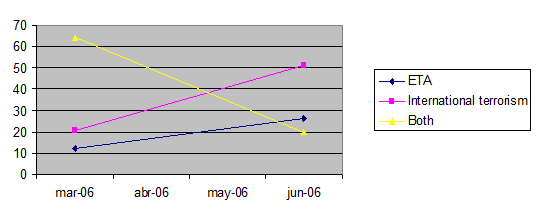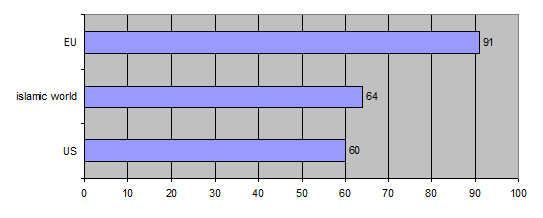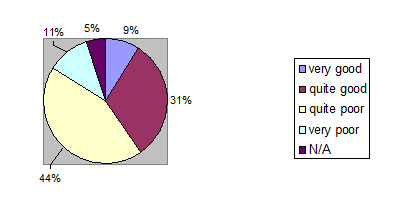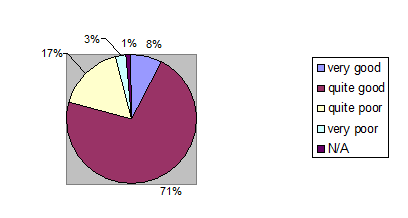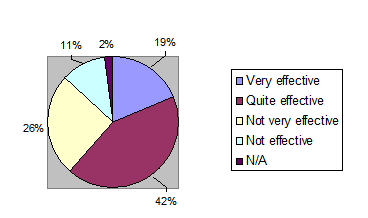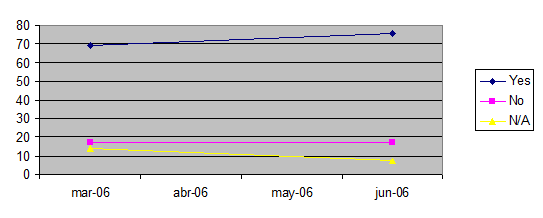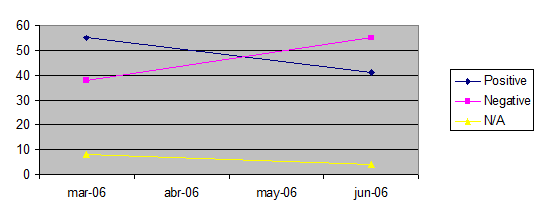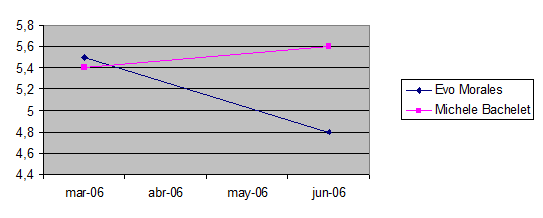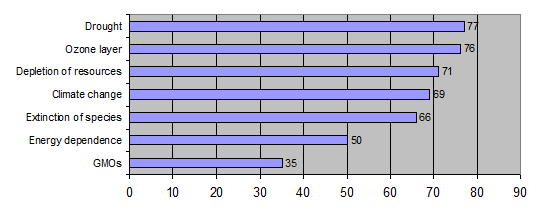TWELFTH EDITION OF THE BAROMETER OF THE ELCANO ROYAL INSTITUTE (JUNE 2006)
Press Summary
Technical data
- Universe: Spaniards of both sexes, 18 years of age and older.
- Sample area: National. All Regions (‘Autonomous Communities’) including Ceuta and Melilla.
- Sample size: 1,208 interviews.
- Sample structure: Stratified multi-stage. Proportional, according to the double criteria of size of the population of each Autonomous Community, with proportional quotas according to the age and sex of the population applied at the individual level.
- Sample error: ±2.9% (1,200n) for global data, p = q = 0.5 and a confidence interval of 95.5%.
- Methodology used: Computer-assisted telephone interview (CATI system); call to home of interviewee.
- Survey period: Field work was carried out between 12 June and 21 June inclusive.
- Field work: TNS – Demoscopia.
1. INTERNATIONAL TERRORISM, MORE OF A THREAT THAN ETA
Since the ceasefire announcement by ETA, 51% of Spaniards believe that international terrorism is a greater threat for Spain than ETA. This represents a considerable increase from the 21% registered in March 2006.
Spaniards approve the measures taken in Spain to combat international terrorism, especially the cooperation between the state’s security forces. Practically all Spaniards (87%) consider it ‘very important to make the Civil Guard and National Police forces cooperate together’ and also to ‘unify the databases of the state’s security forces’ (81%). In this regard, we should also highlight the support for the ‘control over financial institutions to prevent the financing of terrorism’, which 78% consider very important.
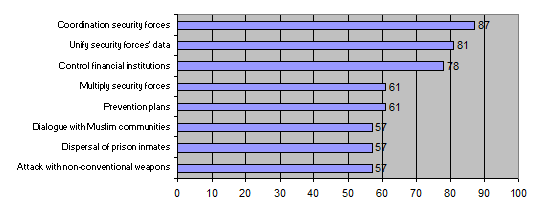
Percentage of ‘very important’ response
Still on the same subject, support for the ‘Alliance of Civilisations’ remains at similar levels to March. Sixty-one per cent believe that the ‘Alliance’ ‘can contribute to the struggle against international terrorism’.
2. GERMANY, THE EUROPEAN CHAMPION
In the context of the fight against terrorism, 91% of Spaniards also believe that co-operation with the EU is very important, more so than with the US.
In relation to the EU, 55% of those interviewed believe the ratification process of the European Constitution is going badly.
Despite this, Spaniards are optimistic and the majority (67%) believe that the Constitution will come into force.
The ratification process and the debate on the future of the Union –which have generated some uncertainty– have had no effect on how Spaniards’ see the general situation of the EU, with a majority of 80% considering it good.
As regards the future, 76% are in favour of ‘deepening the content and institutions of the EU’ before ‘continuing to enlarge the Union to include more countries’ (23%).
However, there are more doubts about how to go about deepening the EU, with a tie between the option of ‘defining and clarifying principles, values and institutions’, supported by 51% of Spaniards, and the option of ‘developing policies and specific actions’, with which 45% are more in agreement.
Germany is for Spaniards ‘the great European champion’: one in two Spaniards believe it is the EU’s most important country, far ahead of the UK (26%) and especially France, which is only mentioned by 12% of those interviewed. But Germany is also the richest nation, the most advanced in science and technology and especially the nation with the best future. In all these aspects France is in third place behind the UK, but is nevertheless considered the country on friendliest terms with Spain and also the most cultured and most democratic.
| (%) | France | Germany | Italy | UK | N/A |
| The richest | 8.1 | 49.8 | 1.0 | 37.6 | 3.5 |
| The most democratic | 34.7 | 26.2 | 5.4 | 26.1 | 7.7 |
| The most advanced in science and technology | 8.3 | 67.6 | 0.7 | 19.3 | 4.1 |
| The most cultured | 36.4 | 27.0 | 8.5 | 23.8 | 4.6 |
| The country on friendliest terms with Spain | 38.2 | 18.9 | 25.8 | 10.1 | 6.9 |
| The most important in the EU | 12.3 | 57.9 | 1.5 | 25.9 | 2.4 |
| The country with the best future | 12.0 | 58.1 | 4.6 | 20.8 | 4.5 |
As a result, on a scale of 0 to 10, Germany scores 7.4 –half a point ahead of France (6.9)–, when until now other studies had indicated that their scores were practically equal.
3. MORE DIPLOMACY IN THE FIGHT AGAINST ILLEGAL IMMIGRATION
Although as we have just seen, once again Spaniards are profoundly pro-European, a large majority (85%) criticise the EU because they believe ‘it does not co-operate sufficiently with Spain in combating illegal immigration to Spain’.
In the fight against this problem Spaniards believe that the most important measure is diplomacy with the immigrants’ countries of origin (49%), followed by border surveillance, which is mentioned as the second most important measure (52%), and repatriation, mentioned in third place (51%).
| (%) | Most Important | 2nd Most Important | 3rd Most Important |
| Border surveillance | 29.0 | 52.5 | 18.0 |
| Repatriation of illegal immigrants | 21.3 | 26.5 | 51.4 |
| Diplomacy with immigrants’ countries of origin | 49.1 | 20.5 | 29.8 |
As a consequence of the importance given to diplomacy, Spaniards have a positive opinion of the holding of the Euro-African conference to fight against illegal immigration: 61% believe that it may be effective compared with 36% who do not share this view.
With respect to the measures considered by the Africa Plan, the ‘fight against human-trafficking mafias’ is supported by 54% of Spaniards, followed by the fight against poverty, which is also very important for 43% of those interviewed.
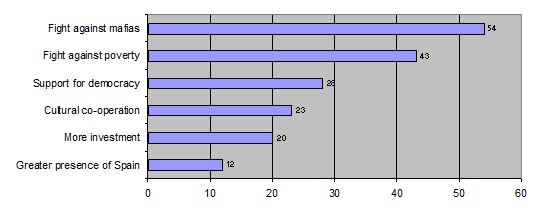
Percentage of ‘very important’ response
4. SUPPORT FOR TROOPS CARRYING OUT MISSIONS ABROAD
Spaniards also massively support the sending of troops to the Congo, which 71% of those interviewed consider positive.
Opinions are even more positive than in the case of the Afghanistan mission which, in any case, is supported by 54% of Spaniards, a slight increase on the 51% recorded in March.
| (%) | Very Positive | Positive | Negative | Very Negative | N/A |
| Afghanistan | 9.4 | 44.4 | 33.0 | 11.8 | 1.4 |
| Congo | 9.7 | 49.4 | 26.5 | 6.7 | 7.7 |
| Bosnia, Kosovo, former Yugoslavia | 15.9 | 55.6 | 20.8 | 6.0 | 1.7 |
Asked about how various occupations active in an international context are valued in Spain –and how they should be valued–, Spaniards believe that military personnel should be more highly valued than they are in Spain at present. The same is true of aid workers, who are awarded the highest score, in contrast with members of the European Parliament (MEPs), who are given the lowest, although they are still at a satisfactory 6.4 on a scale of 0 to 10.
| How they are valued (from 0-10) | How they should be valued (from 0-10) | Difference (should be/actual) | |
| Military personnel | 5.6 | 6.7 | 1.2 |
| Diplomats | 6.6 | 7.0 | 1 |
| Intelligence agents (secret agent, spy, etc.) | 6.0 | 7.1 | 1.2 |
| Businessmen | 6.9 | 7.4 | 1 |
| Euro MPs | 5.7 | 6.4 | 1.1 |
| Aid workers | 6.5 | 8.0 | 1.2 |
The data above are in line with the preference of Spaniards for diplomacy before the use of force. Accordingly, as regards Iran’s uranium enrichment programme, Spaniards are still in favour of the need to negotiate, with support at 56% (very similar to the percentage recorded in the BRIE’s previous wave).
5. UNCERTAINTY WITH RESPECT TO BOLIVIA
The fact that Spaniards prefer diplomacy to conflict is again highlighted in their attitudes to the situation caused by the nationalisation of hydrocarbons in Bolivia.
Following the events of the past few months in Bolivia, there has been a change in the opinion of Spaniards regarding the move to the left in Latin America and its effects on Spain’s interests. There has been a significant increase, from 69% to 76%, in the percentage of Spaniards who believe that the change has in fact occurred.
Whilst in March of 2006, 55% considered the move to the left in Latin America positive and 38% negative, the situation has now reversed, with 55% considering it negative and 41% positive.
The opinion on Evo Morales has also deteriorated, from 5.5 –on a scale of 0 to 10– in March to 4.8 at present. This contrasts with the slight increase regarding Michele Bachelet –from 5.4 to 5.6–, making it evident that when Spaniards evaluate the effect on Spain’s interests of the shift to the left in Latin America they are thinking in terms of the situation in Bolivia.
In any case, Spaniards are optimistic and 65% believe that an agreement will be reached with the Bolivian authorities, compared with 30% who are more pessimistic.
As regards the measures to be taken in response to the Bolivian nationalisation programme, 89% are in favour of ‘intensifying the dialogue with the Bolivian authorities’ and a majority of 78% believe that ‘Spanish investments in other sectors different from energy should be encouraged’.
Only one in three Spaniards are in favour of reducing development aid. Although there is a greater division of opinions regarding the writing off of Bolivia’s debt, more are in favour (52%) than against (45%).
| (%) | In favour | Against | N/A |
| Write-off debt with Spain | 52.3 | 45.0 | 2.8 |
| Intensify dialogue with the Bolivian authorities | 89.4 | 10.2 | 0.4 |
| Restrict immigration to Spain | 49.6 | 49.3 | 1.1 |
| Encourage Spanish investments in other sectors different from energy | 77.6 | 20.4 | 2.0 |
| Reduce development aid | 31.5 | 67.8 | 0.7 |
These attitudes are probably related to the fact that 93% of Spaniards recognise ‘the right of the indigenous populations of Latin America to their natural resources’ and that one in two Spaniards agree with the fact that ‘for 500 years Spain has exploited Latin American countries’. The latter opinion is closely related to the political ideas of those interviewed, as 58% of people on the left believe this to be true compared with only 35% of those on the right.
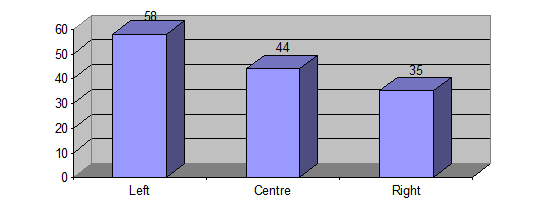
Percentage interviewed in agreement with the statement that ‘for 500 years Spain has exploited Latin American countries’
Nevertheless, 81% consider that ‘Spanish investments have contributed to the development of Latin American countries’.
6. CONCERN OVER ENERGY DEPENDENCE
Also concerning energy, but now turning to Spanish natural resources, one in two Spaniards are ‘very concerned’ by the dependence on foreign energy supplies. This is among the environmental topics of most concern to Spaniards, although behind the depletion of resources, climate change and drought.
Despite this concern for the dependence on foreign energy supplies, there is a division of opinion on the nuclear energy option, which is rejected by 55%. However, the fact that the question includes a reference to the problems of oil supply and the increase in prices has led to support for the nuclear option rising to 41%, which is higher than in other surveys.


